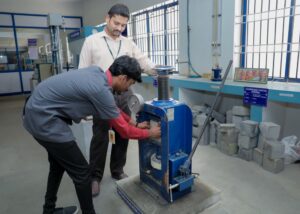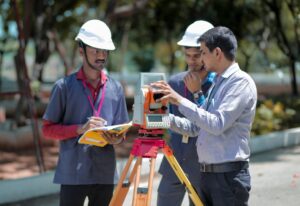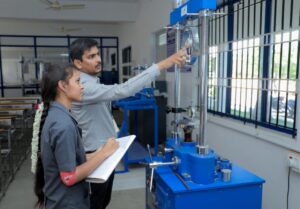
ABOUT US
Department of Civil Engineering has one UG Program (BE-Civil(2010)) and a PG program (ME-Construction Engineering and Management(2014)). Our team of faculty provides the right academic atmosphere for the students to get developed into complete Civil Engineers with aptitude for research. Students are moulded to the requirements of the industry through industry based curriculum, internships, extramural activities, Project Based Learning, outside class hours learning, Skill centric learning and Mini Projects. Quality of students and their achievements in curricular and co-curricular activities have branded our department as a leading Centre.
VISION & MISSION
VISION
- Produce competent Civil Engineering professionals with scientific temper, values, ethics, team spirit and capabilities to face new challenges.
MISSION
- Provide conducing learning environment with state-of- the-art infrastructure facilities, laboratories and teaching learning systems.
- Produce skilled Civil Engineers with skills towards employability, leadership, communication skills with social responsibilities and ethical values.
- Inculcate Professional skills to function as proficient planners, designers and constructors, capable of building sustainable infrastructure for the society.
- Promote research and development activities in the rapidly changing technologies related to Civil Engineering and allied areas.
Program Educational Objectives
PEO1:Successful Careers: Graduate practiced to successful careers in Civil Engineering field that meets the needs of Indian and multinational companies.
PEO2:Technical concepts: Graduate get the confidence and ability among students to synthesize data and technical concepts and thereby apply it in real world problems and to use modern techniques, skill and mathematical engineering tools for solving problems in Civil Engineering.
PEO3:Life-Long Learning: Graduate get knowledge in mathematical,scientific and engineering fundamentals necessary to formulate, solve and analyze engineering problems, make them to work collaboratively on multi-disciplinary projects and engage in life-long learning process throughout their professional life.
Program Outcomes
PO-1:Engineering knowledge: Apply the knowledge of mathematics, science, engineering fundamentals, and an engineering specialization to the solution of complex engineering problems.
PO-2:Problem analysis: Problem analysis:Identify, formulate, review research literature, and analyze complex engineering problems reaching substantiated conclusions using first principles of mathematics, natural sciences, and engineering sciences.
PO-3:Design/development of solutions: Design solutions for complex engineering problems and design system components or processes that meet the specified needs with appropriate consideration for the public health and safety, and the cultural, societal, and environmental considerations.
PO-4:Conduct investigations of complex problems: Use research-based knowledge and research methods including design of experiments, analysis and interpretation of data, and synthesis of the information to provide valid conclusions.
PO-5:Modern tool usage: Create, select, and apply appropriate techniques, resources, and modern engineering and IT tools including prediction and modeling to complex engineering activities with an understanding of the limitations.
PO-6:The engineer and society: Apply reasoning informed by the contextual knowledge to assess societal, health, safety, legal and cultural issues and the consequent responsibilities relevant to the professional engineering practice.
PO-7:Environment and sustainability: Understand the impact of the professional engineering solutions in societal and environmental contexts, and demonstrate the knowledge of, and need for sustainable development.
PO-8:Ethics: Apply ethical principles and commit to professional ethics and responsibilities and norms of the engineering practice.
PO-9:Individual and team work: Function effectively as an individual, and as a member or leader in diverse teams, and in multidisciplinary settings.
PO-10:Communication: Communicate effectively on complex engineering activities with the engineering Community and with society at large, such as, being able to comprehend and write effective reports and design documentation,make effective presentations, and give and receive clear instructions.
PO-11:Project management and finance: Demonstrate knowledge and understanding of the engineering and management principles and apply these to one’s own work, as a member and leader in a team, to manage projects and in multidisciplinary environments.
PO-12:Life-long learning: Recognize the need for, and have the preparation and ability to engage in independent and life-long learning in the broadest context of technological change.
Program Specific Outcomes
PSO-1: To be able to identify, formulate and develop solution methodology for various issues related to Civil Engineering processes.
PSO-2: To apply technical skills and Modern Engineering tools for Civil Engineering day to day practice and design Civil Engineering Structures using relevant codes of practice, materials, techniques and software.
Course Outcomes
Faculty Details
Laboratory
STRENGTH OF MATERIALS LABORATORY
Strength of material laboratory provides the basic knowledge of strength of materials and the students can perform different tests on variety of materials. Experiments are performed to measure the properties of materials such as impact strength, tensile strength, compressive strength, hardness, etc.

SURVEYING LABORATORY

The students will possess knowledge about Survey field techniques. The Surveying Laboratory has a wide variety of modern surveying equipment, such as total stations, theodolite, and levels for basic instructional and research purposes. Undergraduate students use the laboratory as an integral part of their surveying coursework and obtain any topographic information that can help their capstone design projects, such as highway design and land development
SOIL MECHANICS
The knowledge of the Soil Mechanics Laboratory is necessary for all Civil Engineering works as the determination of the engineering properties of soils plays an important role in all types of construction. To determine the classification of soil into silt, sand and clay etc. To determine the Index and Engineering properties of soil like specific gravity, water content, shrinkage limit, plastic limit, permeability, consolidation, shear strength tests etc. The knowledge gained from this laboratory will be useful to understand the theoretical subjects like Soil Mechanics and Foundation Engineering. This laboratory is also useful in the field of structural design of sub structures like footings, pile foundations and retaining walls.

FLUID MECHANICS LABORATORY

The Fluid Mechanics laboratory is designed to investigate fluid characteristics and conduct experiments on both incompressible and compressible flow. Facilities are available for researching the principles of fluid statics, as well as the kinematics and kinetics of fluid flow, to enhance our students’ hands-on experience. It is an introductory course that covers flow behaviour, fluid forces, and analytical tools. The experiments’ aims include determining the forces created when fluid flow occurs across a solid object, applying the control volume technique, flow measurements, major and minor losses in the flow, and determining the state of flow using the Reylods experiment.
CONCRETE & HIGHWAY ENGINEERING LABORATORY
- Concrete is one of the important construction materials. Study of its constituents and their properties is essential for preparing desired mix so as to develop required strength necessary for various types of Structures. The durability of the structures depends upon the care with which ingredients of concrete are selected, mixed, placed, compacted and cured. Concrete is used not only for construction of building, but also for concrete roads, gravity dams, retaining walls, water tanks, airport runway pavements, etc.
- Knowledge of the subject is essential for the Design of Concrete Structures. Strength, workability, durability are important characteristics of concrete. Compressive strength of concrete describes the load caring capacity, workability is the indicator of ease with which we work on concrete, whereas durability shows the resistance of concrete to environmental attack.
- All these properties of concrete are determined by performing the experiments in Concrete & Highway Engineering Laboratory. Also, the students will able to design various grades of concrete by DOE, ACI and Indian method of concrete mix design. In addition, the properties of construction materials used in highway engineering are also determined in this laboratory.

Professional Society (ICI)
NAME OF THE SOCIETY:
INDIAN CONCRETE INSTITUTE (ICI), CHENNAI,
Inaugurated By: 12.10.2012
Organizational Membership ID: 9799
FACULTY I/C:
Mr.V.RAGHUPRASATH, AP/Civil
OBJECTIVES:
- To promote growth of concrete construction and its sub-specializations.
- To disseminate information and to arrange to train personnel for the needs of changing concepts in the technology.
- To collaborate with national and international agencies in creating better understanding of concrete construction technology.
- To indentify R & D problems of practical relevance to concrete construction technology.
- To institute and distribute awards for outstanding achievements in concrete construction technology.
- To arrange periodical seminars and exhibitions on the subject and
- To arrange annual lecture series on selected topics of relevance to concrete constructions.
BENEFITS:
- One free Delegation to participate in ICI Events.
- Concessional delegation fee for Two for Institutional Member and Five for Commercial
- Member to participate in national and international events conducted by ICI.
- Receipt of 2 copies of quarterly ICI Journal which carries valuable technical articles.
- Receipt of monthly e-bulletin “ICI Update” to keep abreast of happenings in IC1.
- Publication of peer reviewed technical articles in ICI Journal.
- Publications of ICI at concessional cost.
- Access to ICI’s reference library.
- Support from ICI to conduct Training Programmes, Workshops, Seminars, Symposia etc.,
- Participation in ICI organized exhibitions to show case your Products/Services.
Report:
Faculty Publications
Students Achievements
Faculty Achievements



